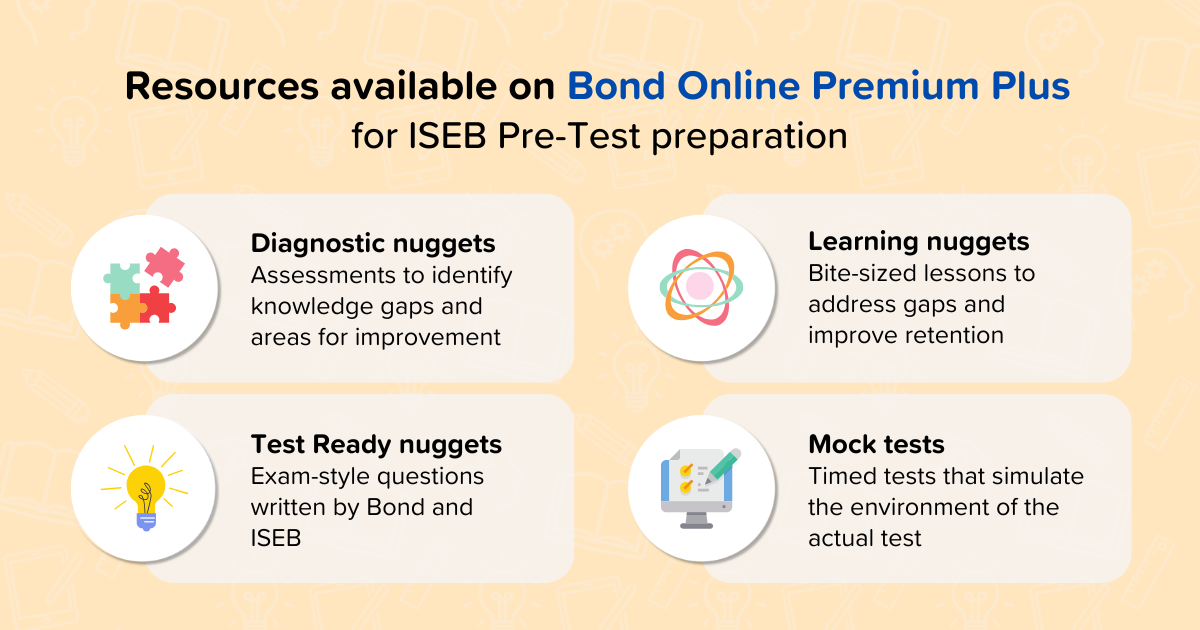Estimated reading time: 11 minutes
The ISEB Pre-Tests are fast approaching, and you might find yourself in a last-minute scramble to prepare your child for them. With the right approach and resources, success in the exam is still very much attainable.
In this article, we will guide late starters on how to make the most of the remaining time to ensure that your child is well-prepared for the ISEB Pre-Tests using Bond Online Premium Plus.
Bond Online Premium Plus is instantly accessible online, and is the only test prep platform featuring ISEB’s content. This content is broken down into bite-sized chunks called nuggets that help to promote independent learning, and provide instant feedback so your child can learn from their mistakes as they go. Additionally, the platform’s AI-powered recommendations ensure your child’s revision is personalised and effective, making it a great tool for maximising revision efforts.
Become Familiar with the ISEB Pre-Tests
Ensure that your child is familiar with the real tests, including the format, question types, and timing. Resources like the ISEB walkthrough and mock tests on Bond Online Premium Plus are a great way to introduce the test environment.
As the only ISEB-endorsed test preparation platform, Bond Online Premium Plus contains the most realistic experience mirroring the actual Pre-Tests. The platform focuses on content assessed in the tests, in addition to containing over 2,000 questions written by ISEB specifically for test practice.
We advise your child to complete as many mock tests as they can for each subject before the test. This is effective for helping your child practice time management and becoming accustomed to the exam layout.
Assigning a mock test is simple: visit your Guardian account and click ‘Assign mock test’ on your learner. Your child can attempt eight mock tests per month, and their results can be viewed in your Dashboard.
Additionally, familiarise your child with basic exam strategy, such as how to manage time effectively. Though the tests are adaptive and may vary in length for each candidate, on average they will be approximately the following durations:
- English test: 40 minutes
- Mathematics test: 40 minutes
- Verbal reasoning test: 25 minutes
- Non-verbal reasoning test: 30 minutes
Incorporating a plan to process and answer questions efficiently is arguably just as important as revising for each subject. Having a strategy in place to stay calm and confident in the exam will lead to great results.
Prioritise Your Areas of Focus
When time is running short, it is crucial to prioritise your efforts. The ISEB Pre-Tests cover four subjects, namely English, maths, verbal reasoning, and non-verbal reasoning. For more information, our Ultimate Guide to the ISEB Pre-Tests contains plenty of guidance on what each test will cover and tips on how to best prepare for each subject.
To get the most effective use of your remaining time, begin revision by identifying the topics that need the most work. Use the test preparation resources on Bond Online Premium Plus to do so.
Diagnostic nuggets
On Bond Online Premium Plus, have your child complete diagnostic nuggets on their Recommended Path. These self-marking assessments can help the platform’s AI identify areas that need improvement and provide relevant recommendations for your child to focus on.
You can then analyse your child’s performance in your Guardian Dashboard. Here, you can view how well your child has done in specific topics, and pinpoint areas that they need to work on before the exam. To do so, go into the Guardian Dashboard and click into a course, where you can view recently attempted nuggets and see how your child performed in each question.
Learning nuggets
Once you've identified areas for improvement, concentrate your child’s efforts on those specific topics. First, use learning nuggets in the My Courses tab: these contain slideshows and videos to provide context and explain each topic in the form of an easily digestible micro-lesson.
This is especially helpful for verbal and non-verbal reasoning, as these subjects may not be taught in some schools. Learning nuggets provide valuable insights into how actual verbal and non-verbal reasoning test questions are structured, along with tips on how your child should be answering each question type unique to these subjects.
Test Ready nuggets
Once your child understands the topic better, move on to Test Ready nuggets. These provide an opportunity for your child to face questions designed for the Pre-Tests and perfect their exam answering techniques.
Additionally, these nuggets offer comprehensive practice across various topics and question types, helping your child become familiar with the demands of the real test. Since questions often follow a similar format, practising consistently is key to achieving success.
Tip: To find these nuggets, simply go into a Subject page and search for the ‘Test Ready’ topic.
Follow a Study Plan
Using insights from your Guardian Dashboard, create an action plan based on your child’s progress. In addition to revising specific topics, we recommend completing a Test Ready nugget every week for each subject, as these contain a variety of question types and difficulties to assess your child’s abilities.
Tip: Test Ready nuggets contain hundreds of questions, so don’t worry about repeating them as your child will face different questions each time!
We suggest including a variety of practice material in your study plan, such as learning nuggets, subject-level Test Ready nuggets, and mock tests. If your child is struggling to stay motivated, give them an incentive by working towards achievements on the platform. Each time they unlock a badge, try matching the achievement by giving them a small reward to keep them driven.
Some children find it easier to focus on one subject per week, so ensure that your study plan is suitable for your child’s own preferred revision style. With that being said, we recommend including a variety of topics into their revision which can help improve knowledge retention. As your child completes each task on their plan, they will gain confidence and a sense of accomplishment.
The AI-driven insights and recommendations on Bond Online Premium Plus provide an effective way to focus your child’s preparation on the areas they need to revise the most. Moreover, the platform can help your child use the time remaining before the test most efficiently, giving you both the opportunity to keep focused and calm at the last minute.
While last-minute preparation for the ISEB Pre-Tests may be challenging, remember that dedication and a strategic approach can still lead to excellent results. Don’t forget to balance intensive study with breaks to unwind and destress.
Sign up for a 7-day free trial to Bond Online Premium Plus today and help your child achieve success in the ISEB Pre-Tests. Learn more on our website.









